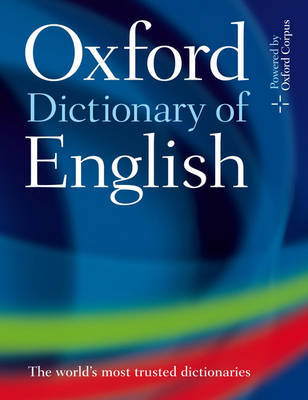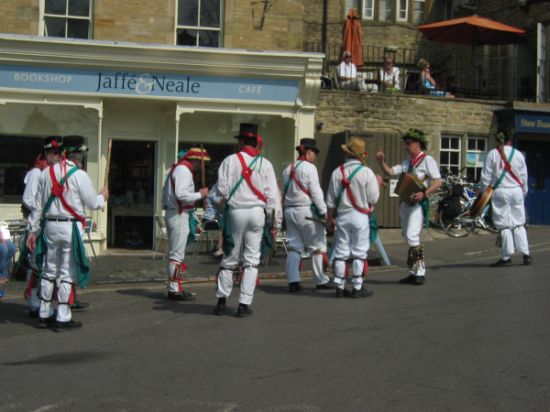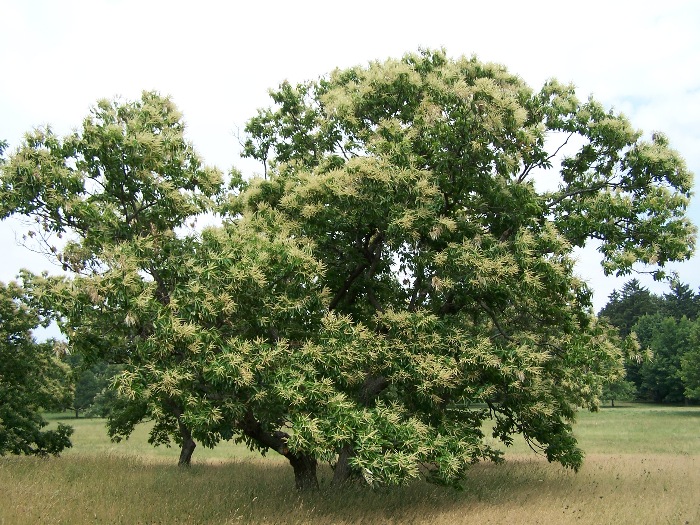By Philip Durkin
The obvious answer to ‘when is a book a tree?’ is ‘before it’s been made into a book’ – it doesn’t take a scientist to know that (most) paper comes from trees – but things get more complex when we turn our attention to etymology.
The word book itself has changed very little over the centuries. In Old English it had the form bōc, and it is of Germanic origin, related to for example Dutch boek, German Buch, or Gothic bōka. The meaning has remained fairly steady too: in Old English a bōc was a volume consisting of a series of written and/or illustrated pages bound together for ease of reading, or the text that was written in such a volume, or a blank notebook, or sometimes another sort of written document, such as a charter.
The argument for…
The pages of books in Anglo-Saxon times were made out of parchment (i.e. animal skin), not paper. But nonetheless a long-standing and still widely accepted etymology assumes that the Germanic base of book is related ultimately to the name of the beech tree. Explanations of the semantic connection have varied considerably. At one point, scholars generally focused on the practice of scratching runes (the early Germanic writing system) onto strips of wood, but more recent accounts have placed emphasis instead on the use of wooden writing tablets.
Words in other languages have followed this semantic development from ‘material for writing on’ to ‘writing, book’. One example is classical Latin liber meaning ‘book’ (which is the root of library). This is believed to have originally been a use of liber meaning ‘bark’, the bark of trees having, according to Roman tradition, been used in early times as a writing material. Compare also Sanskrit bhūrjá- (as masculine noun) ‘birch tree’, and (as feminine noun) ‘birch bark used for writing’.
The argument against…
This explanation has troubled some scholars. There are two main reasons for this. Firstly, the words for ‘book’ and ‘beech’ in the earliest recorded stages of various Germanic languages belong to different stem classes (which determine how they form their endings for grammatical case and number), and the word for ‘book’ shows a stem class that is often assumed to be more archaic than that shown by the word for ‘beech’.
Secondly, in Gothic (the language of the ancient Goths, preserved in important early manuscripts) bōka in the singular (usually) means ‘letter (of the alphabet)’. In the plural, Gothic bōkōs does also mean ‘(legal) document, book’, but some have argued that this reflects a later development, modelled on ancient Greek γράμμα (gramma) ‘letter, written mark’, also in the plural γράμματα (grammata) ‘letters, literature’ (this word ultimately gives modern English grammar), and also on classical Latin littera ‘letter of the alphabet, short piece of writing’, also in the plural litterae ‘document, text, book’ (this word ultimately gives modern English literature).
In light of these factors, some have suggested that book and its Germanic relatives may show a different origin, from the same Indo-European base as Sanskrit bhāga- ‘portion, lot, possession’ and Avestan baga ‘portion, lot, luck’. The hypothesis is that a word of this origin came to be used in Germanic for a piece of wood with runes (or a single rune) inscribed on it, used to cast lots (a practice described by the ancient historian Tacitus), then for the runic characters themselves, and hence for Greek and Latin letters, and eventually for texts and books containing these.
However, many scholars remain convinced that book and beech are ultimately related, and argue that the forms and meanings shown in the earliest written documents in the various Germanic languages already reflect the results of a long process of development in word form and meaning, which has obscured the original relationship between the word book and the name of the tree. For some more detail on this, and for references to some of the main discussions of the etymology of book, see the etymology section of the entry for book in OED Online.
This article first appeared on the OxfordWords blog.
Philip Durkin is Deputy Chief Editor of the Oxford English Dictionary, and the author of Borrowed Words: A History of Loanwords in English.
Language matters. At Oxford Dictionaries, we are committed to bringing you the benefit of our language expertise to help you connect with your world.
Subscribe to the OUPblog via email or RSS.
Subscribe to only language articles on the OUPblog via email or RSS.
The post When is a book a tree? appeared first on OUPblog.

Due to the incredible response to Angus Stevenson's morning post, we've decided to share a little bit more about the brand new Concise Oxford English Dictionary, which is celebrating its 100th birthday. This fully updated 12th edition contains more than 240,000

By Grace Labatt
The 2011 Academy Awards® take place this Sunday, February 27, the culmination of months of speculation about who will wear what, who will have the hardest time with the TelePrompTer, and, of course, who will win. But regardless  of who goes home with an Oscar—whether it’s Natalie Portman for playing a tormented ballerina or Annette Bening for playing a tormented wife—language lovers already have plenty to celebrate with this year’s honorees. Films in 2010 had an array of unusual linguistic choices that highlighted their screenwriters’ unique skills.
of who goes home with an Oscar—whether it’s Natalie Portman for playing a tormented ballerina or Annette Bening for playing a tormented wife—language lovers already have plenty to celebrate with this year’s honorees. Films in 2010 had an array of unusual linguistic choices that highlighted their screenwriters’ unique skills.
Kings and billionaires, both accidental
The film to generate the most adulation for its language was probably The Social Network, in which the dialogue from screenwriter Aaron Sorkin was spoken so quickly (and so articulately, even for Harvard students) that a 162-page script became not a five-hour saga but a two-hour rush of suspense. Sorkin’s script made legalese and technology terms not just comprehensible but exciting, introduced the term “Winkelvii” (to describe the pompous Winklevoss twin characters), which now gets 14,000 hits on Google, and reminded us that articles are never hip—according to one of the characters, Facebook’s success is rooted in founder Mark Zuckerberg’s decision to drop the “The” from the title.
The Social Network is a frontrunner, but its main competition is The King’s Speech. One of the central themes of this historical biopic of King George VI is the importance of clarity in communication—something all writers and speakers strive for, and a goal achieved by the film itself. At once point King George remarks, “I am the seat of all authority because they think that when I speak, I speak for them.” Scriptwriter David Seidler uses this tactic—words as tools to enthrall and enlist—to make audience members align themselves with an actor playing a king (which couldn’t be further from what most audience members are).
Ballerinas, boxers, and LaBoeufs
Three other best picture nominees couldn’t be more different from one another, but are united by a common thread. Black Swan, True Grit, and The Fighter all delve into a distinctive subculture and embrace that culture’s linguistic idiosyncrasies. Dancers, cowboys, and boxers use language that would sound foreign to anyone outside their professions: chaîné, tendu, fouetté, rond de jambe, tinhorn,
0 Comments on And the winners are…language lovers! as of 2/25/2011 11:29:00 AM
By Juliet Evans, OUP UK Publicity Manager, Dictionaries and Reference

A. They’re all in the list of ‘Top Ten Most Stolen Books in the UK’!
Weighing in at a rather hefty 6.6lb and measuring 11 by 8.5 inches, the Oxford Dictionary of English is no lightweight. Even so, it has appeared in a list of top 10 books which are ‘the most stolen’ from independent UK booksellers, published in The Times on 6 February 2009.
We guess it’s a dubious honour for Oxford Dictionaries to be on the ‘most wanted’ list of book thieves, but we’re in good company, as you can see from the list below.
The Oxford Dictionary of English (ODE) joins an eclectic mix of strictly practical reference books, fantasy and crime fiction, and children’s literature. All - except ODE - are paperback and/or portable.
 “Notably, ODE is the only dictionary to appear in the Top Ten,” says Catherine Soanes, editor of ODE, “You’d have thought that our smaller dictionaries, such as the Pocket Oxford or the Compact Oxford, would have been more pocketable (or hideable in a bag or coat) but book-pilferers obviously think that, with its 350,000 words, phrases, and meanings, ODE is the one worth risking prosecution for. Thank goodness that thousands of readers prefer to follow the legal route and buy their copies - and at £35, they don’t need deep pockets to do so.”
“Notably, ODE is the only dictionary to appear in the Top Ten,” says Catherine Soanes, editor of ODE, “You’d have thought that our smaller dictionaries, such as the Pocket Oxford or the Compact Oxford, would have been more pocketable (or hideable in a bag or coat) but book-pilferers obviously think that, with its 350,000 words, phrases, and meanings, ODE is the one worth risking prosecution for. Thank goodness that thousands of readers prefer to follow the legal route and buy their copies - and at £35, they don’t need deep pockets to do so.”
It seems that the ’literature lifters’ come in all shapes and sizes - from old ladies, to students, and from mums with prams (the ultimate getaway vehicle?) to people working within the publishing industry itself. So it seems you just can’t trust anyone these days. And you know you have to be very suspicious of people with long coats too - no book is ever to big to steal…
Of course, the loss of so many books has a very detrimental effect on booksellers, particularly on the small family-run independent stores. The Times reports that there have been cases of books being ‘stolen to order’, or placed online, and there have even been stories about books being passed around in pubs. It’s interesting to note that crime writer Martina Cole’s books appear at number 7 on the ‘most stolen’ list.
We talked a bit more to Patrick Neale of Jaffé and Neale Bookshop in the Cotswolds area of England, who says, “In my Waterstone’s days dictionaries were very popular with the thieving community. I never found the pub where all these ‘knocked off’ Oxford Dictionaries were being ‘fenced’. I wonder if the thieves checked that all their terminology was in there. I really don’t know where all those dictionaries went. But I suppose they were used for pub quizzes…”

Patrick says that he now has to keep a particular eye on local walking maps walking out of the door of his bookshop. But could it be that, in the form of traditional English Morris dancers (shown in the picture above), he has found the ultimate deterrent to would-be thieves, we ask?
Ten most stolen books from UK shops
1. London A-Z maps
2. Ordnance Survey maps
3. Terry Pratchett novels
4. Harry Potter books
5. Lonely Planet travel guides
6. The Lord of the Rings
7. Martina Cole novels
8. Jacqueline Wilson novels
9. Oxford Dictionary of English
10. The Highway Code




 of who goes home with an Oscar—whether it’s Natalie Portman for
of who goes home with an Oscar—whether it’s Natalie Portman for  “Notably, ODE is the only dictionary to appear in the Top Ten,” says Catherine Soanes, editor of ODE, “You’d have thought that our smaller dictionaries, such as the
“Notably, ODE is the only dictionary to appear in the Top Ten,” says Catherine Soanes, editor of ODE, “You’d have thought that our smaller dictionaries, such as the 
A dictionary? Are you kidding me?! Do you know how embarrassing it would be to get caught sneaking out of a Waterstone’s with a dictionary tucked up in your coat? And then escorted from the store, sadly mumbling, “I just wanted to learn…” I am beyond amazed.
[...] The Oxford Dictionary of English is one of the UK’s most stolen books. [...]